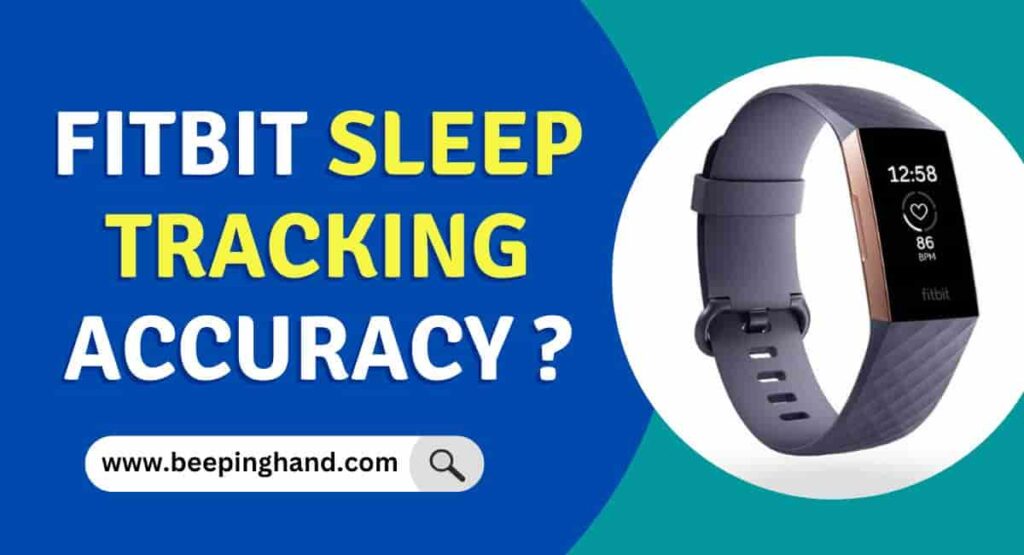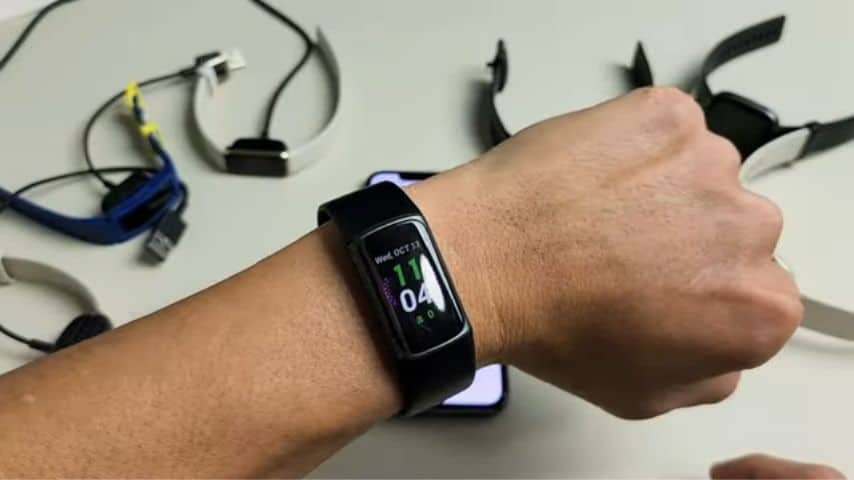Fitbit, a popular brand in the fitness-tracking industry, has been offering sleep-tracking features in its devices for years. This feature has been widely used by its users to track their sleep patterns, duration, and quality.
However, the question that arises is How accurate is Fitbit’s sleep tracking feature? To know about Fitbit Sleep Tracking Accuracy Read this.
Fitbit Sleep Tracking Accuracy

If you are wondering to know about the Sleep Tracking Accuracy of Fitbit and How does Fitbit Track Sleep then you have come to the right place. Here, we’ve shared detailed information.
Understand Fitbit Sleep Tracking
The sensors used in Fitbit devices include an accelerometer, which measures your movements, and a heart rate monitor, which measures your heart rate. The algorithms used in Fitbit devices analyze the data collected by these sensors to determine when you’re sleeping, how long you’re sleeping, and the quality of your sleep.
Accuracy of Fitbit Sleep Tracking
Fitbit sleep tracking feature has been found to be generally accurate in tracking sleep duration. However, its accuracy in tracking sleep stages (light sleep, deep sleep, and REM sleep) has been questioned by some researchers.
It’s been said that the Accuracy of Sleep Tracking is not very accurate by any smartwatch brand. So, it is said that sleep tracking is not 100% accurate.
Factors Affecting the Accuracy of Fitbit Sleep Tracking
Several factors can affect the accuracy of Fitbit’s sleep-tracking feature. These factors include –
- Movement – Fitbit’s sleep tracking feature relies on an accelerometer to measure movement. If you move around a lot during sleep, it can affect the accuracy of the feature.
- Heart rate variability – Fitbit’s sleep tracking feature uses heart rate variability to measure sleep stages. However, this measure can be affected by several factors, including stress, medication, and caffeine consumption.
- Fitbit model – Different Fitbit Models use different sensors and algorithms, which can affect the accuracy of the sleep tracking feature. Newer models tend to have more advanced sensors and algorithms, which may result in more accurate tracking.
- Sleep environment – The environment in which you sleep can affect the accuracy of the sleep tracking feature. For example, if you sleep with a partner or pets, their movements can affect the accuracy of the feature.
Improving the Accuracy of Fitbit Sleep Tracking

While Fitbit’s sleep tracking feature may not be 100% accurate, there are several ways to improve its accuracy:
- Wear your device properly – Ensure that you wear your Fitbit device properly to ensure that the sensors are in contact with your skin.
- Keep your device up to date – Ensure that your Fitbit device is up to date with the latest software updates to ensure that it’s running on the latest algorithms.
- Use Sleep Mode – Fitbit’s Sleep Mode is designed to optimize the accuracy of the sleep tracking feature. It turns off certain features that may affect the accuracy of the feature, such as notifications.
- Consider other factors – While Fitbit’s sleep tracking feature is a useful tool for tracking your sleep patterns, it’s important to consider other factors that may affect your sleep quality. These factors include your diet, exercise routine, and sleep environment. Addressing these factors can help improve your overall sleep quality.
How does Fitbit Track Sleep?
Fitbit employs a combination of hardware and software technologies to monitor your sleep throughout the night. The process involves the following steps –
Actigraphy Sensors
Fitbit devices, depending on the model, are equipped with actigraphy sensors, typically an accelerometer and sometimes a gyroscope. These sensors are the primary tools used to detect your movements while you sleep. When you wear your Fitbit device to bed, it continuously tracks your movements, distinguishing between periods of restlessness and actual wakefulness.
Heart Rate Monitoring
Fitbit also utilizes its optical heart rate monitoring technology during sleep tracking. By monitoring your heart rate throughout the night, the device can determine the different sleep stages, including light, deep, and REM (Rapid Eye Movement) sleep. During REM sleep, our heart rate tends to increase, and Fitbit can identify these patterns to provide sleep stage insights.
Sleep Stage Analysis
Fitbit’s sophisticated algorithms process the data collected from the actigraphy sensors and heart rate monitors. By analyzing your movements and heart rate patterns, the device can accurately determine when you fall asleep, how long it takes you to do so, and the duration of each sleep stage.
Sleep Duration and Efficiency
Based on the data collected, Fitbit calculates the total duration of your sleep and the time spent in each sleep stage. Additionally, it provides a sleep efficiency score, which is the percentage of time you spend asleep compared to the total time you spend in bed. A higher sleep efficiency score indicates better sleep quality.
Sleep Insights
Fitbit’s companion app displays a detailed breakdown of your sleep data, presenting it in a user-friendly format. You can view the time you fell asleep, woke up, and how much time you spent in each sleep stage.
Wrapping Up
This article is all about Fitbit Sleep Tracking Accuracy. Fitbit sleep tracking provides users with valuable insights into their sleep patterns and overall sleep quality. While it may not be 100% accurate in capturing every minute detail of your sleep, it offers a reliable and convenient way to monitor your sleep duration and patterns over time.
I hope this article was helpful to you. If you have any queries then you can ask in the comment box. We’ll answer all your questions. You may read more about Fitbit Versa 2 Not Tracking Steps or Heart Rate, Factory Reset Fitbit Smartwatch. Apart from all these, you can get all your health data in your Fitbit App
FAQ’s Fitbit Sleep Tracking Accuracy
How accurate is Fitbit sleep tracking feature?
Studies have shown that Fitbit’s sleep tracking feature is generally accurate in tracking sleep duration. However, its accuracy in tracking sleep stages has been called into question.
What factors can affect the accuracy of Fitbit’s sleep tracking feature?
Several factors can affect the accuracy of Fitbit’s sleep tracking feature, including movement during sleep, heart rate variability, and the Fitbit model you have.
Can I improve the accuracy of Fitbit’s sleep-tracking feature?
Yes, there are several ways to improve the accuracy of Fitbit’s sleep-tracking feature. These include wearing your device properly, keeping it up to date with software updates, using Sleep Mode, and addressing other factors that affect sleep quality.
What is Sleep Mode in Fitbit?
Sleep Mode is a feature in Fitbit that turns off certain features that may affect the accuracy of the sleep tracking feature, such as notifications.
How can I view my sleep data on Fitbit?
You can view your sleep data on the Fitbit app or website by going to the “Sleep” section. Here, you can see your sleep duration, sleep stages, and other sleep metrics.